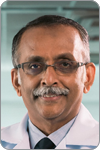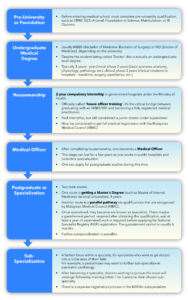Thinking of studying medicine? We spoke to Associate Professor Dr Ganesh Ramachandran of Taylor’s University to uncover what it really takes—the joys and the tears, from academic grit to financial cost and the future of healthcare.
WORDS LIM TECK CHOON
 FEATURED EXPERT FEATURED EXPERTASSOCIATE PROFESSOR DR GANESH RAMACHANDRAN Head of the School of Medicine Faculty of Health and Medical Sciences Taylor’s University |
FIRST, LET’S SET SOME REALISTIC EXPECTATIONS
When the topic of expectations and misconceptions comes up, Associate Professor Dr Ganesh Ramachandran smiles.
Shows such as ER and Grey’s Anatomy have many people believing that doctors lead exciting lives full of medical and glamorous intrigues, while “celebrity doctors” on social media can tend to focus on the glamorous or fun side of the job.
“You always see good outcomes and you don’t see that many bad outcomes,” Dr Ganesh points out.
Reality is more nuanced.
“Far fewer is the coverage about the other side of being a doctor: the hours, the difficulties encountered during daily practice, times when things don’t go quite as right as you want it to go, and more,” says Dr Ganesh.
MEDICINE IS A COMMITMENT
- From the moment one is accepted into medical school, it is the start of a long journey to being a doctor.
- “Unlike some other tertiary studies, you don’t have much flexibility,” Dr Ganesh points out. “There isn’t much wiggle room in choosing or dropping subjects; every subject that is offered must be taken, and you have to finish and pass that subject.”
- Hence, the pressure can be felt from the early stages of the medical education journey.
IT’S A LONG JOURNEY—LONGER THAN MOST PEOPLE MAY REALIZE
- Dr Ganesh tell us: “When you are enrolled into medical school, you are enrolled for a programme that is longer than other programmes in terms of the years of study.”
- It is not just about attending lectures and laboratory sessions; there will be a great amount of hospital-based teaching that requires the medical student to develop practical skills on their own—often quickly and on the job.
- Completing the undergraduate component is just the beginning of a whole new chapter in one’s medical studies.
While actual details may vary from university to university, here is a general overview of the medical education journey in Malaysia. Check with the university for the most updated information.

More Explanation on Postgraduate or Specialization
Dr Ganesh explains that parallel pathway is a route where doctors pursue international postgraduate qualifications (MRCP, MRCS/FRCS, MRCOG/FRACOG, etc) that are recognized by the Malaysian Medical Council (MMC).
These are usually British-, Australian-, and New Zealand-based qualifications.
- Instead of enrolling in a local Master’s programme, which is competitive and full-time with limited spaces, they can continue working as Medical Officers in government service.
- They will sit for external postgraduate exams from accredited foreign institutions, such as:
- Membership of the Royal College of Physicians (MRCP), UK for internal medicine
- Membership of the Royal College of Surgeons (MRCS), UK for surgery
- Membership of the Royal College of Obstetricians and Gynaecologists (RCOG), UK for obstetrics and gynaecology
- Fellowship of the Royal Australian College of General Practitioners (FRACGP), Australia for family medicine
- Once they pass the exams and meet other criteria such as supervised training and workplace assessments, they may be gazetted as specialists in Malaysia.
- This route helps to overcome issues such as limited seats in local Master’s programmes.
- It also offers more flexibility, as doctors can continue working while studying—although note that this route is still very demanding.
- The availability of a parallel pathway also helps to fill urgent gaps in specialist numbers to meet national requirements in Malaysia
| Important Note The MMC only recognizes certain specialist qualifications, so always check with them first before committing to a pathway. |
How About PhD?
- A medical doctor (MD) who has completed their specialist training (paediatrics, surgery, internal medicine, etc) can apply for a Masters and/or Doctor of Philsophy (PhD) in a field related to their specialty, such as medical research, public health, clinical research, basic sciences (anatomy, physiology, biochemistry), or biomedical sciences.
- A Masters/PhD is focused on research and producing original contributions to knowledge.
- Dr Ganesh tells us that this route is best suited for those wishing to:
- Lead or contribute to medical research
- Pursue academic careers in basic science areas
- PhD programmes usually take around 3 to 5 years to complete.
| After completing their housemanship, some doctors choose to become general practitioners and start their own clinics. However, Dr Ganesh notes that this trend is shifting due to a paradigm change in healthcare—from a focus on treatment to a focus on prevention. More clinics are now being run by specialists in family medicine, who are uniquely positioned to collaborate with families on maintaining health and reducing disease risks. |
WHAT QUALITIES SHOULD A MEDICAL STUDENT HAVE?
“I always tell my students that there’s only 3 qualities that medical student needs,” says Dr Ganesh.
Hardworking
As we have seen, the road to being a doctor is long and full of challenges—exams, long hours, stress, and more.
Resilience, determination, and a willingness to put in long hours of study and work would go a long way to help one walk that road to the end.
Honesty
“The medical profession is driven a lot by integrity,” Dr Ganesh explains.
He adds that no doctor has a 100% track record in successes. “There are times when we get it wrong, and because of that mistake, there will be consequences,” he points out. Therefore, honesty is essential.
This applies as well to admitting to colleagues or supervisors that one is not well-versed in certain procedures. That way, mistakes and errors could be avoided.
Humility
Dr Ganesh explains that this relates to one’s willingness to listen and learn.
“Just because you are a doctor, it doesn’t mean that you know everything,” he says. “There are many people in the ward such as the nurses that spend more time taking care of the patients. Therefore, when they point things out to you, you must have that mindset to listen to what they say.”
He further adds that medicine is not a solo practice. “You can be a doctor, but what you do is only as good as the skills that you have. But more than that, it’s also the people that you have around you, the team. And in that team, there are nurses, ward assistants, and other people that can teach you things, as well as help you along the way.”
“So always be humble enough to acknowledge that there are many people in your team who actually contribute to the success,” Dr Ganesh goes on tell us. “When something goes well, people thank the doctor, but they forget that there’s a whole team around that doctor that have contributed to get a good outcome!”
WHAT SPECIALIZATIONS WOULD BE ESSENTIAL IN THE FUTURE?
Dr Ganesh emphasizes that when choosing a specialization, one should follow their passion rather than focusing on financial incentives.
He adds that, given Malaysia’s aging population, there will be a growing demand for specialists in fields such as geriatrics including geriatric psychiatry, to address the unique health needs of older adults.
Beyond doctors, he highlights the importance of having more specialized medical staff—such as occupational therapists and nurses—who can provide essential care outside of hospital settings, ensuring comprehensive support for the elderly.
| This article is part of our series on medical education in Malaysia. |








